

Written by Stephen Day
Gas Safe Engineer
Updated: 7th November, 2025
If your boiler keeps losing pressure but you can’t see a leak, it could be caused by trapped air, a faulty part, or a hidden issue in the system.
Get a new boiler quote, save up to £550 per year (0% APR available).
In this guide, our Gas Safe engineers explain what might be happening, how to check safely, and when to call a professional.
If your boiler pressure keeps dropping with no visible leaks, there’s still an underlying issue.
Pressure loss doesn’t always mean water on the floor - air in the system, worn parts, or hidden faults can cause gradual drops over time.
Boiler pressure controls how hot water and heating circulate.
When it falls too low, radiators may stop working or the boiler can shut down.
If your boiler losing pressure is caused by a leak, check out our full boiler losing pressure guide!
Modern boilers use a sealed system that keeps water circulating under pressure.
When water heats up, it expands, and the expansion vessel absorbs this change to keep pressure stable.
If pressure drops, air or water is escaping somewhere, or the vessel isn’t regulating correctly.
Condition | Pressure Range | Notes |
Cold | 1.0 - 1.5 bar | Normal before heating turns on |
Hot | 1.8 - 2.0 bar | Slight rise during operation |
Below 1.0 bar | Too low | May stop heating or trigger a fault |
Above 2.5 bar | Too high | Could release water via the relief valve |
If the gauge reads below 1 bar when cold, your boiler likely needs repressurising. You can check our guide on what your boiler pressure should be for more details on ideal readings and how to fix pressure issues safely.
Yes. Some boilers release water internally or through overflow pipes where it evaporates.
Air pockets, valve faults, or hidden leaks under floors can also lower pressure without visible signs.
A failed expansion vessel or relief valve can discharge water too slowly to notice.
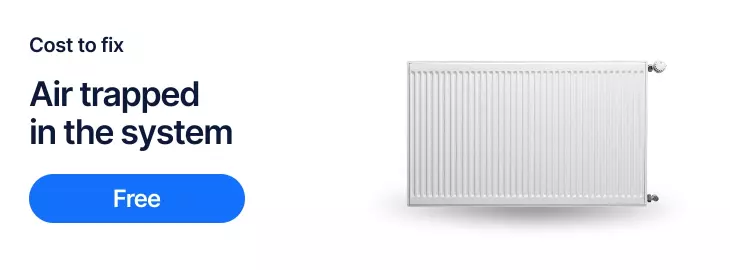
Bleeding radiators releases air and a small amount of water, lowering system pressure.
Trapped air can also build up naturally over time.
Fix: Repressurise the system using the filling loop until the gauge reads 1 to 1.5 bar.
Repairable? Yes, a simple fix.
Cost: Free if done yourself.
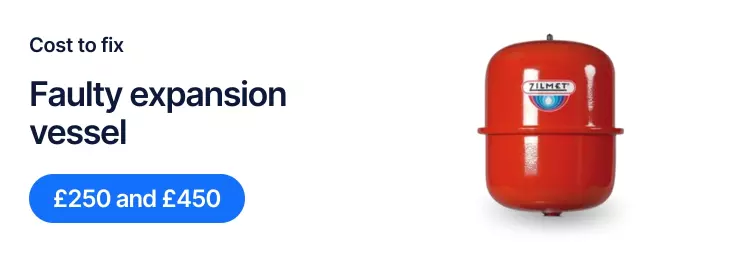
If the expansion vessel loses charge or the diaphragm fails, it can’t absorb pressure changes.
The relief valve may then release water internally or outside through a copper pipe.
Fix: A Gas Safe engineer can recharge or replace the vessel.
Repairable? Yes, with the right tools and parts.
Cost: £250-£450 depending on your boiler.
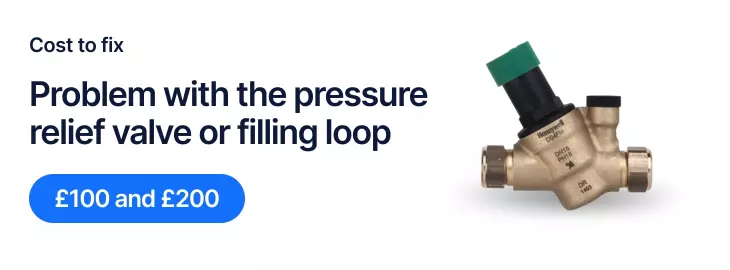
A faulty pressure relief valve can discharge water slowly, causing pressure loss.
A filling loop left slightly open can also make pressure fluctuate.
Fix: Make sure the filling loop is fully closed. If pressure keeps dropping, have the relief valve checked.
Repairable? Yes, straightforward for an engineer.
Cost: £100-£200.
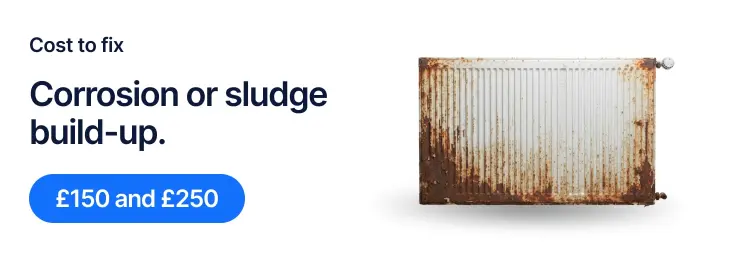
Rust and sludge can block circulation and cause pressure imbalances.
Corrosion also weakens joints, leading to minor leaks.
Fix: A professional power flush and inhibitor treatment restore system health.
Repairable? Yes, and helps prevent future issues.
Cost: £150-£250.

Cold weather can make pipes contract and cause small pressure dips.
If the pressure stabilises as the system warms up, it’s usually not a fault.
Fix: Monitor the gauge and top up if needed.
Repairable? Not required unless pressure keeps dropping.
Cost: Free.
Check the gauge when the system is cold, then again after 24 hours.
A steady drop means there’s a fault somewhere in the system.
Look for damp patches, rust, or water residue.
A dripping condensate pipe can also signal internal pressure loss.
Noises like gurgling or bubbling suggest trapped air.
Bleeding radiators can usually solve this.
Ensure both valves on the filling loop are turned off after topping up.
If left slightly open, pressure will keep rising and falling.
Check around the boiler, skirting boards, and pipe joints for moisture or staining - signs of hidden leaks.
Turn off the boiler and allow it to cool.
Locate the filling loop - a flexible metal hose with two valves underneath the boiler.
Slowly open both valves until you hear water flowing.
Watch the gauge rise to 1-1.5 bar, then close both valves.
Turn the boiler back on and recheck the reading once it heats up.
Cost: Free if done yourself.
If pressure falls again within a day or two, there’s likely an internal fault such as a vessel or valve issue.
Avoid topping up repeatedly, as it introduces air and can cause corrosion.
Call a Gas Safe engineer to diagnose the cause.
Cost: Diagnostic visit £80-£120.
Pressure drops repeatedly
Damp patches near the boiler
Fault codes or flashing pressure warnings
Unusual hissing or gurgling noises
Switch off your boiler and book an inspection if you spot any of these.
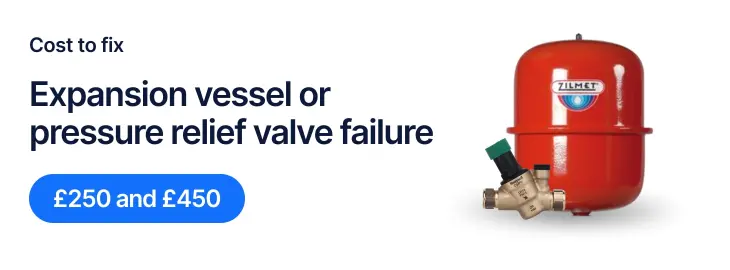
If the expansion vessel fails, it can’t maintain stable pressure.
The relief valve may then discharge water automatically. Both parts should be tested and replaced if necessary.
Cost: £250-£450 depending on boiler type.
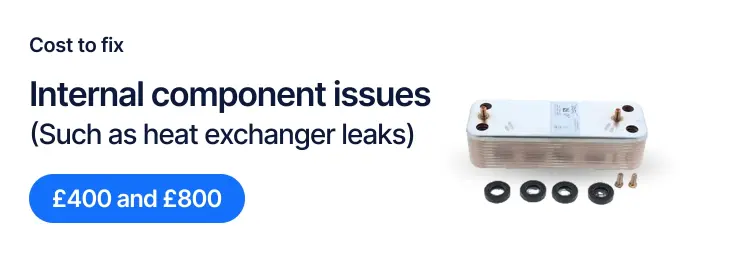
Cracks or corrosion in the heat exchanger can cause pressure loss inside the boiler.
This fault isn’t visible externally and needs professional assessment.
Fix: Replace the damaged part if repair isn’t viable.
Cost: £400-£800.
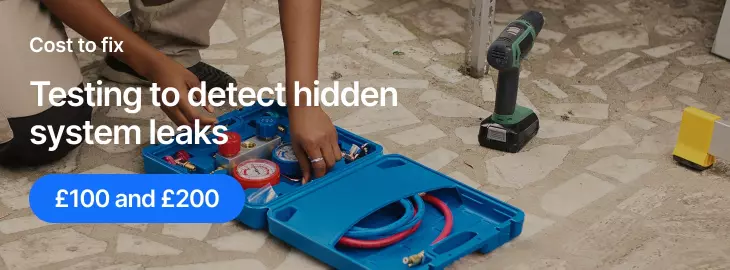
Engineers can pressure-test your system to confirm whether water is escaping internally or externally.
This ensures the right fix is applied without unnecessary part replacements.
Cost: £100-£200.
Book annual servicing and system checks - A yearly boiler service helps spot corrosion, worn seals, or early signs of pressure loss.
Keep inhibitor levels topped up - Corrosion inhibitors protect against rust and sludge build-up, keeping pressure stable.
Monitor pressure monthly, especially in winter - Check your gauge every few weeks and top up if it drops slightly.
Watch for early warning signs - Cold radiator spots, drips, or new noises can indicate air or developing leaks.
A boiler can lose pressure even without a visible leak.
Trapped air, a faulty expansion vessel, or hidden pipework issues are often to blame.
Topping up occasionally is fine, but repeated drops mean there’s a deeper problem.
Always call a Gas Safe engineer if pressure keeps falling.
*Any prices are guides only
Last updated: 7th November, 2025

Written by Stephen Day
Gas Safe Engineer at iHeat
Stephen Day is a Gas Safe registered and FGAS certified engineer with over 20 years of hands-on experience in the heating, cooling, and renewable energy industry, specialising in boiler installations, air conditioning, and heat pump systems.
LinkedInArticles by Stephen Day are reviewed by iHeat’s technical team to ensure accuracy and reliability.

27th February, 2026
Condensing boilers are considered to be some of the most efficient boilers out there on th...
 Read Article
Read Article

26th February, 2026
Vaillant boilers use a variety of parts to ensure efficient operation. This section looks...
 Read Article
Read Article

26th February, 2026
Leaving the heating on low all day might seem like a way to avoid the chill without bursti...
 Read Article
Read Article
No obligation. Takes less than 60 seconds.